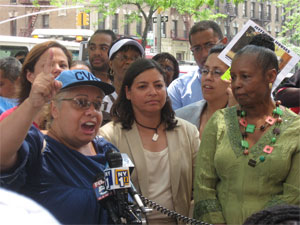It seems as though Congress and the Bush administration are nearing approval of the $700 billion Wall Street bailout package. It was clear from the get go that low- and middle-income people were not going to be the winners here, no matter the specifics of the package; some details that are coming out now about the current state of the deal are only confirming that prediction. From the Washington Post:
Democrats also made a number of concessions, abandoning demands that bankruptcy judges be empowered to modify home mortgages on primary residences for people in foreclosure. They also agreed not to dedicate a portion of any profits from the bailout program to an affordable housing fund that Republicans claimed would primarily assist social service organizations that support the Democratic Party, the official said.
The New York Times does report that the package “requires the government to use its new role as owner of distressed mortgage-backed securities to make more aggressive efforts to prevent home foreclosures,” but reaffirms that “some Democrats had sought to direct 20 percent of any such profits [from the governmental purchase of assets at prices lower than they may one day be worth] to help create affordable housing, but Republicans opposed that and demanded that all profits be returned to the Treasury.”
I don’t claim to be any expert on economics, but it seems to me that the benefit to normal working Americans (i.e. “Main Street”) will be quite limited. The whole rigmarole about taxpayers (hopefully) being repayed for the bailout through the government receiving equity stakes in rescued companies is cold comfort given that we can’t trust or expect the government to spend that recovered money on things that actually help improve the lives of low- and middle-income Americans, like education, health care, affordable housing, or welfare.
Well, I should be clear – corporate welfare is a-ok, as this entire bailout package demonstrates. But welfare for individuals and families who are just trying to survive? Nah, that kind of welfare doesn’t fly, nor does the affordable housing that might help rescue them from this collapsing housing market. So Wall Street screws working-class Americans with the sub-prime mortgage fiasco, which then backfires and contributes to Wall Street getting screwed, and then Wall Street are the only ones who can really count on being bailed out? Sounds like a big ol’ FAIL to me.
Cross-posted at Feministe

